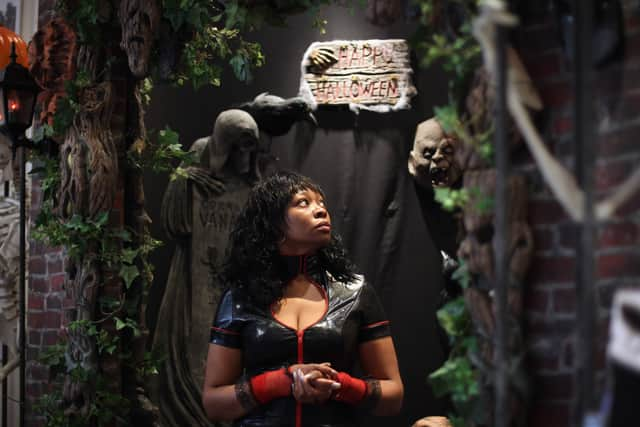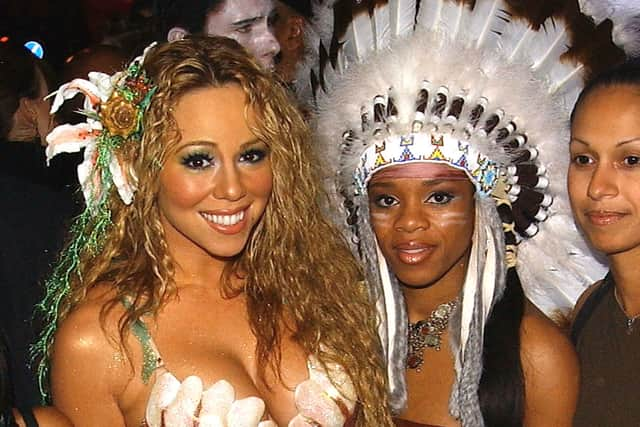What is cultural appropriation? Understanding the difference with cultural appreciation this Halloween


In recent years, conversations surrounding cultural appropriation and what it means have gained traction. This is, in part, due to the rise in social media and various public figures being criticised for wearing fancy dress costumes (or adopting trends) which fetishise or trivialise minority cultures.
Examples in the news have included performances of the Haka ‘war dance’ by those who are not Maori, and the Great British Bake Off hosts donning sombreros and shaking maracas in a recent Mexico-themed episode.
Advertisement
Hide AdAdvertisement
Hide AdAs Halloween approaches, the issue of cultural appropriation becomes more relevant, as the event provides us with plenty of opportunities for fancy dress. But, before we dive into how to avoid appropriating different cultures through our chosen costumes this Halloween, Esteban Touma, teacher and content producer at Babbel Live, is here to help us understand what cultural appropriation is, and what to consider when choosing your costume for this year’s Halloween festivities.
What is cultural appropriation?
According to the Oxford Dictionary, cultural appropriation is the inappropriate adoption of the practices, customs, or aesthetics of one social or ethnic group, by members of another. How can you distinguish between showing appreciation of a culture which differs from your own, and appropriation?
The difference lies in knowledge and recognition. Do you know the meaning and context of the piece you would like to wear? Do you have an understanding of that culture’s symbols, and if using them, are you honouring that meaning?


For instance, the implications around wearing a sari whilst attending an Indian wedding alongside friends and family from this culture differs significantly from dressing up as an Indian person for a fancy dress party. The latter fails to recognise the cultural importance of the dress in Indian culture, effectively reducing the symbolic weight of a tradition into a stereotype. The former falls under appreciation, as wearing traditional clothing to attend a ceremonial event is acting within cultural bounds and in an environment which not only credits a specific minority’s customs, but celebrates them. It is worth noting that a different culture’s clothing should be worn without changing the colour of your skin, your hair, or your features.
Advertisement
Hide AdAdvertisement
Hide AdIt’s also worth noting that historically, people in power have appropriated the symbols of those they have oppressed in order to ridicule and humiliate them, in order to perpetuate their oppression beyond the use of force. So when you use someone else’s dress, you may unwillingly be a participant in the history of cultural oppression, even when your intentions might be the best. This is why cultural appropriation might be most offensive when taking on the culture and style of people who have been dealt a great deal of injustice or oppression.


How do I know if my costume is demonstrating appropriation or appreciation?
There is a lot of nuance around the concept of dressing up as a specific character from a culture outside your own, and it’s one that varies by context and situation. Several things need to be considered when choosing a character to dress up as, including:
The context of the show/film: If you’re basing your costume on a character from media, do your research to learn what year the show/film came out in, who created the show, if an organisation profited from the show/film without notifying or respectfully depicting a specific culture or person, and if this show/film perpetuates ignorant stereotypes. It’s important not to shy away from these questions, even if they seem in-depth for a simple Halloween costume.
The context of actors portrayed in the show/film: If you’re, for example, considering dressing up as Scarlett O’Hara from Gone With The Wind, consider socio-political contexts around when the film was made, the era it’s depicting, and how it’s aged within modern-day culture. If you’re a bit ‘iffy’ when reflecting on those points, you may need to reevaluate your costume options.
Advertisement
Hide AdAdvertisement
Hide AdPublic opinion around the show/film: How did, and how do, people of the minority group depicted respond to this show or film? Often, one of the most important things you can do when examining the boundaries around a costume is listen to the voices of people of that culture - do your research to see how minorities feel about the depictions of characters in this film, and respect the general consensus in whatever you choose to adapt within your costume, or if it’s better to find an alternative.
When unsure, it’s often best to err on the side of caution, and explore other options. If you know someone who belongs to that culture, don’t ask them! They shouldn’t be asked to speak for their entire culture or ethnicity. Doing so might make you fall into the same problem you want to avoid: reducing the significance of a multifaceted culture into a perpetuation of stereotypes.
How you’re representing this character through your interpretation of their costume: Are you changing your skin colour, hair, or makeup? Are you donning cultural body art? Are you changing the way to speak to adopt a specific accent, slang, or mannerism? If these alterations are necessary to convey what character you’re dressing up as, you might be appropriating rather than appreciating a minority culture.
Your own context, and the context of your own culture in relation to the costume: How have people from your culture interacted with the minority group? Is there any history of oppression or power, and if so, how would your costume relate to that issue? A reflection on power dynamics could go a long way into figuring out why your costume might be offensive.
Advertisement
Hide AdAdvertisement
Hide AdIt’s important to examine the wider context of a costume before committing, and learn about the culture and people associated with it beforehand, no matter how good an idea it may seem. Often, if you can respectfully, knowingly, and appropriately pay tribute to a culture, whether that be through a family-wide Encanto costume, or through dressing up as a specific Disney princess - you’re doing your part in pursuing appreciation, over appropriation.
Why is cultural appropriation offensive?
While conversations around cultural appropriation often crop up in everyday life, they tend to become more prominent around Halloween. This is because stereotypical costumes depicting specific cultures are often worn with ignorance, and neglect the culture from which the costume comes from.
Many times, costumes pull from traditions that are taken out of context and warped by popular culture, typically becoming fetishised rather than respected or understood. Naturally, this can be offensive to a wide range of people, especially those who are closely linked or come from the culture being taken out of context.
Wearing a headdress to be a Native American or Indigenous Chieftain, or dressing as a ‘gypsy’ or a fortune teller and therefore representing Romani culture, are examples of common ways people trivialise, glamourise, and generally benefit from a culture, and rarely involve showing respect and long-term attention to those belonging to that culture.
Advertisement
Hide AdAdvertisement
Hide AdReducing an entire group to a ‘costume’ that is taken off at the end of the night is insensitive to the history, struggles, and gravity of marginalised groups, and often shows the privilege the wearer has in being able to pick the most flattering parts of a culture, and neglect the rest.
Comment Guidelines
National World encourages reader discussion on our stories. User feedback, insights and back-and-forth exchanges add a rich layer of context to reporting. Please review our Community Guidelines before commenting.
